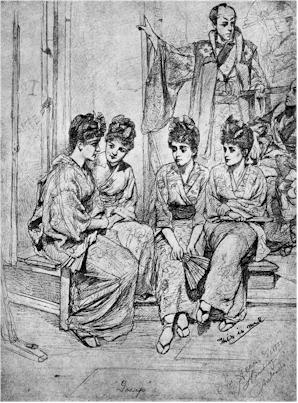|
 The D'Oyly Carte Opera Company was a business as much as it was an artistic theatrical troupe. Gilbert and Sullivan had signed a five-year contract in 1883 with Richard D'Oyly Carte. Both were given the right of veto over engaging members of the company. Gilbert once admitted that his method of writing the shows was based on knowing who his leads were and designing roles that suited them.
The D'Oyly Carte Opera Company was a business as much as it was an artistic theatrical troupe. Gilbert and Sullivan had signed a five-year contract in 1883 with Richard D'Oyly Carte. Both were given the right of veto over engaging members of the company. Gilbert once admitted that his method of writing the shows was based on knowing who his leads were and designing roles that suited them.
The everyday running of the theatre and the business, however, was left to Carte. Sullivan was probably quite content with this arrangement, which left him free to worry about only creative details and to indulge in his busy social life amongst the upper classes. During the run of The Mikado, Gilbert began to chafe under the limitations the contract imposed on his involvement. "I am merely a hack author employed by you to supply you with pieces on certain terms," he wrote in an angry letter of complaint. He wanted to be consulted and updated much more often than he had been. Carte replied that calling meetings of the three men on every little detail would be impractical. He also reminded Gilbert that while all three were contracted to sharing profits, Carte alone was liable for any losses. Gilbert reluctantly backed off, especially since he received no support from Sullivan, who wished to absent himself from the whole discussion. But this minor quarrel was an ominous foreshadowing of the fatal explosion that was to occur over carpet expenses during the run of The Gondoliers a few years later.
All three partners, of course, shared in one major business venture: the decision to cast and send out touring companies, first to the rest of Britain, and then throughout the world. The drawing above was made backstage at a performance of The Mikado in Hamburg, Germany. Jessie Vince has identified herself (This is me) gossiping with other cast members. Copyright laws were often non-existent or ineffective; so a touring production was one way of battling pirated performances and bringing the partners the revenues their creative efforts deserved.
Rights to The Mikado in the U.S.A. were assigned by a bidding process. When the losing bidder began to mount a rival production, Carte declared war. While the pirates could easily obtain a script from theatre programs, the orchestra scores have never been published. (They must be rented.) Liberty's refused to make costume materials available to the rival and Carte bought up all the Japanese costumes in Paris when he learned that the scoundrel was heading there. When an opening date was announced for the unauthorized production, two months ahead of that planned for the "real" one, Carte hastily assembled the cast who thought they were being groomed for a tour of England, swore everyone to secrecy, herded them on board a steamer under assumed names, and opened in New York ahead of the rival production by almost a week. Such was the cut-throat business when a property was as profitable as The Mikado. Unfortunately, the courts were often of no help, as the following New York verdict by a staunch Ulster-born Tammanyite makes clear: "Copyright or no copyright, commercial honesty or commercial buccaneering, no Englishman possesses any rights which a true-born American is bound to respect."
Sullivan accompanied the American tour, in the process visiting Salt Lake City and performing at the organ in the Mormon Tabernacle. Gilbert stayed in England to keep an eye on the original, since (unlike amateur productions like ours, eh, Doug?) the cast might be tempted to change things. He caught "Pooh-Bah" repaying a loan to "Pitti-Sing" by slipping her small coins night after night on stage. And he ordered "Ko-Ko" to stop rolling over on the floor when pushed by the Mikado. "But I got a big laugh by it." "So you would if you sat on a pork pie."
Gilbert's insistence on discipline extended to banning intermingling of the sexes in dressing rooms at intermission, leading to the company's nickname: The Savoy Boarding School. But he and Sullivan and Carte raised the artistic and social bar for the theatre to the heights of respectability we take for granted today.
|



 The D'Oyly Carte Opera Company was a business as much as it was an artistic theatrical troupe. Gilbert and Sullivan had signed a five-year contract in 1883 with Richard D'Oyly Carte. Both were given the right of veto over engaging members of the company. Gilbert once admitted that his method of writing the shows was based on knowing who his leads were and designing roles that suited them.
The D'Oyly Carte Opera Company was a business as much as it was an artistic theatrical troupe. Gilbert and Sullivan had signed a five-year contract in 1883 with Richard D'Oyly Carte. Both were given the right of veto over engaging members of the company. Gilbert once admitted that his method of writing the shows was based on knowing who his leads were and designing roles that suited them.